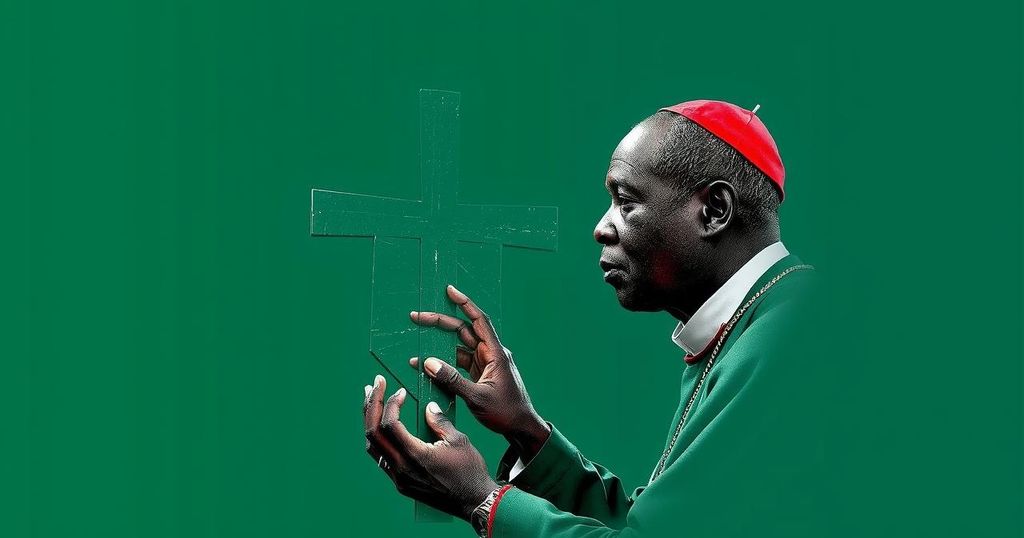Cardinal Mulla Advocates Synodality as a Path to Peace in South Sudan
Cardinal Stephen Ameyu Mulla of South Sudan highlighted the importance of synodality as a means to achieve peace within his war-torn country and its episcopal conference. He discussed the need for dialogue to solve ongoing conflicts and emphasized the adverse effects of the current instability in both South Sudan and neighboring Sudan. Mulla called for the implementation of peace agreements to enhance the nation’s social and political conditions.
In a recent press conference in Rome, Cardinal Stephen Ameyu Mulla of the Archdiocese of Juba articulated his belief that a pragmatic approach to synodality could pave the way for peace in South Sudan and foster unity within the divided episcopal conference. He emphasized, “The synod journey helps us the Church to resolve many problems together,” asserting that the concept of synodality—defined as the act of journeying together—serves as a critical pathway to peace in his nation plagued by ongoing strife. Cardinal Mulla underscored that the dialogue initiated through synodality has the potential to extend beyond church confines, addressing wider humanitarian issues prevalent in South Sudan since its independence from Sudan in 2011. He acknowledged the shared bishops’ conference between South Sudan and Sudan and recognized the complex history of discord between the countries. The cardinal stated, “We have tried our best to continue to help the poor people of South Sudan and Sudan,” indicating the need for more collective discussion not only among bishops but also among the broader South Sudanese community. Cardinal Mulla expressed disappointment in how the revitalized peace agreement, brokered by the Vatican in 2018, remains largely unimplemented, stating, “We continue to insist as bishops that this revitalized peace agreement should be implemented by the letter.” He highlighted the inability of leaders to fulfill the agreement, contributing to South Sudan’s ongoing instability. Adding to the country’s grievances, he pointed to the adverse effects of the conflict in neighboring Sudan, describing it as a paradox where the Church expands, yet the social and political conditions deteriorate in South Sudan. He lamented the destruction wrought by the civil war in Sudan, noting the displacement of thousands and damage to Church properties. Lastly, Cardinal Mulla articulated a vision for transformation through synodality, suggesting it could reshape how both political and ecclesiastical leaders perceive their responsibilities toward the populace. By emphasizing service over power, he asserted that dialogue is essential for resolving both ecclesial and political challenges, concluding, “Synodality, going together, is the way for us to resolve our own problems.”
The article centers on the remarks of Cardinal Stephen Ameyu Mulla regarding the application of synodality as a means to achieve peace in South Sudan, a country that has faced significant turmoil since its independence from Sudan in 2011. The cardinal’s comments come amidst ongoing instability in South Sudan, including issues related to poor implementation of peace agreements and rising social and political challenges. Furthermore, the civil war in Sudan poses significant humanitarian concerns, affecting not only South Sudanese refugees but also the South Sudanese Church and community. The cardinal champions dialogue and collective action as essential elements of resolving the conflicts faced by both nations.
Cardinal Stephen Ameyu Mulla’s assertions reflect a hopeful yet firm belief in the power of synodality to foster peace in South Sudan amidst the backdrop of complex historical and social challenges. By advocating for an approach centered on dialogue and service, Mulla emphasizes the necessity for unity and collaboration among church leaders and the broader community to overcome persistent conflicts. The cardinal’s call for implementing revitalized peace agreements underscores the critical need for actionable change within both South Sudan and Sudan to address the humanitarian crises and restore stability.
Original Source: www.pillarcatholic.com




Post Comment